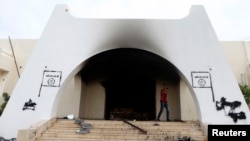CAIRO —
The Libyan government declared a state of emergency in the country's eastern port city of Benghazi Monday after heavy clashes between the Libyan army and members of an Islamist group believed to be behind last year's attack on a U.S. diplomatic mission. At least seven soldiers were reported killed and more than 39 people wounded.
Heavy artillery and rocket fire shook parts of Benghazi Monday as Islamist militiamen continued to battle an army brigade loyal to the government. Libyan government television showed civilian victims of the fighting at a Benghazi hospital being treated for gunshot and shrapnel wounds.
Fighting has been going on since late Sunday between government forces and fighters from Ansar al-Sharia, whose members stand accused by U.S. authorities of having participated in the 2012 attack on the U.S. consulate that led to the deaths of four Americans including U.S. Ambassador Chris Stephens.
Militiamen attacked an army patrol near a mosque in the central Birqa district of the city. A number of government soldiers were killed in the attack.
Incoming Interior Minister Sabri Abdel Karim told a press conference in the capital, Tripoli, that the government is demanding militiamen leave Benghazi and that the Libyan Army and police hope to assume control of the city.
He said the fighting in Benghazi demonstrates the need to enforce a government decree requiring all armed militias to withdraw from the city and hand over control to the police and army. He said the armed forces must be allowed to fulfill their legal role and impose order.
Members of Libya's National Assembly representing Benghazi met to discuss the fighting, urging militias to pull out of the city and other cities across the country. Deputy Parliament Speaker Ezzedine al-Awami urged the parties to use reason and behave responsibly.
He called on a government resolution to be enforced that mandates militias to withdraw from Libyan cities. He asked civic leaders to engage in mediation with the parties in order to restore order.
The fighting in Benghazi came just a day after an official visit by Libya's interim Prime Minister Ali Zeidan to London, where he met with U.S. Secretary of State John Kerry and British Foreign Secretary William Hague. Zeidan said that Libya is trying to achieve democracy:
He said that the plan is to put an end to armed militias and is a move in the direction of democracy. He says it answers the demands of the Libyan people whose blood was spilled in the quest for democracy.
Abdel Hafiz Gogha, spokesman for Libya's former Transitional National Council, told state television that militiamen were “running amok” in Benghazi and that the interim government should have found a way to disarm them sooner.
Human rights activist Zahra Lanfy told state television that a plan is needed to “incorporate young fighters into the army and other government institutions.”
Along the outskirts of the capital Tripoli, an armed militia with reported ties to former Libyan leader Moammar Gadhafi seized control of a government arms depot, causing panic in several neighborhoods.
Heavy artillery and rocket fire shook parts of Benghazi Monday as Islamist militiamen continued to battle an army brigade loyal to the government. Libyan government television showed civilian victims of the fighting at a Benghazi hospital being treated for gunshot and shrapnel wounds.
Fighting has been going on since late Sunday between government forces and fighters from Ansar al-Sharia, whose members stand accused by U.S. authorities of having participated in the 2012 attack on the U.S. consulate that led to the deaths of four Americans including U.S. Ambassador Chris Stephens.
Militiamen attacked an army patrol near a mosque in the central Birqa district of the city. A number of government soldiers were killed in the attack.
Incoming Interior Minister Sabri Abdel Karim told a press conference in the capital, Tripoli, that the government is demanding militiamen leave Benghazi and that the Libyan Army and police hope to assume control of the city.
He said the fighting in Benghazi demonstrates the need to enforce a government decree requiring all armed militias to withdraw from the city and hand over control to the police and army. He said the armed forces must be allowed to fulfill their legal role and impose order.
Members of Libya's National Assembly representing Benghazi met to discuss the fighting, urging militias to pull out of the city and other cities across the country. Deputy Parliament Speaker Ezzedine al-Awami urged the parties to use reason and behave responsibly.
He called on a government resolution to be enforced that mandates militias to withdraw from Libyan cities. He asked civic leaders to engage in mediation with the parties in order to restore order.
The fighting in Benghazi came just a day after an official visit by Libya's interim Prime Minister Ali Zeidan to London, where he met with U.S. Secretary of State John Kerry and British Foreign Secretary William Hague. Zeidan said that Libya is trying to achieve democracy:
He said that the plan is to put an end to armed militias and is a move in the direction of democracy. He says it answers the demands of the Libyan people whose blood was spilled in the quest for democracy.
Abdel Hafiz Gogha, spokesman for Libya's former Transitional National Council, told state television that militiamen were “running amok” in Benghazi and that the interim government should have found a way to disarm them sooner.
Human rights activist Zahra Lanfy told state television that a plan is needed to “incorporate young fighters into the army and other government institutions.”
Along the outskirts of the capital Tripoli, an armed militia with reported ties to former Libyan leader Moammar Gadhafi seized control of a government arms depot, causing panic in several neighborhoods.








